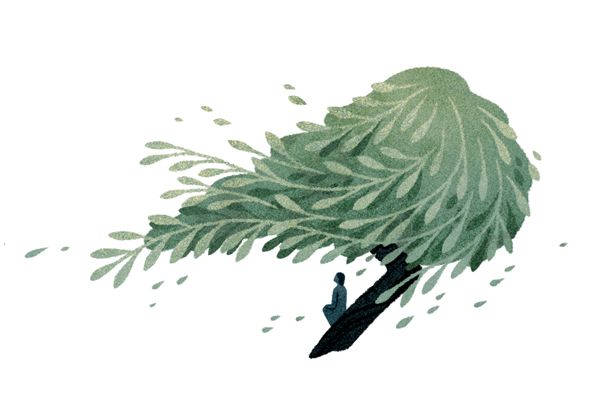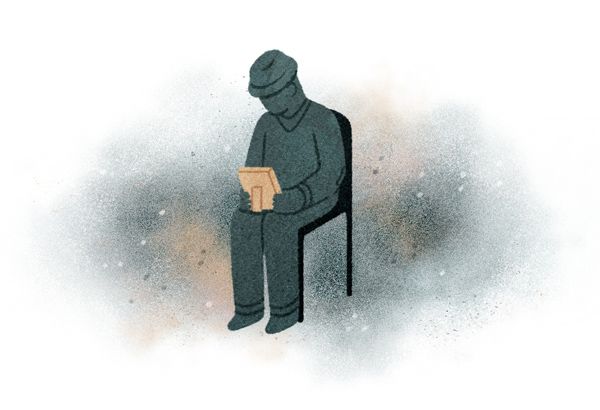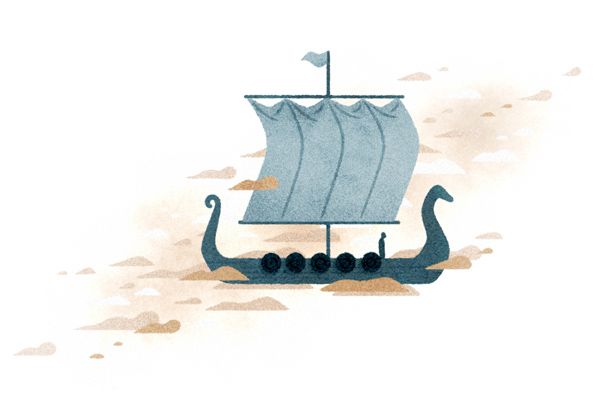"Years of funeral talk tricked me into thinking everyone maps out what to do with their body once they’re done with it."
As the grandson of a hearse driver, I’ve been rehearsing my dream funeral for years. Whenever I visited my grandparents in Florida, my grandfather, Norman, and I would spend nights on the patio plotting all the funerals we wished we could have — as if you could have multiple.
We considered the logistics of Viking funerals, sky burials, underwater burials and even having our ashes shot into space. We discussed the basics too, should one have to go the traditional funeral route: the price of caskets, the legroom in hearses, the fact that hardly anyone ever tips the hearse driver.
After years of listening to this conversation, my grandma, Beverly, once reminded us that they had prepaid for caskets, plots, hearses — the standard funeral fare. She’d already picked out Norman’s final suit too: the same black suit he drove hearses in.
Years of funeral talk tricked me into thinking everyone maps out what to do with their body once they’re done with it. My wife, Nancy, and I knew what each other’s dream funeral would look like well before we knew what our dream wedding would look like. She wants to be placed in a pine casket beneath a Japanese weeping willow tree. My sister, Shelby, wants to be cryogenically frozen; my other sister, Randi, can’t make up her mind — she likes all of our ideas.

I’d forgotten that not every family keeps such close track of everyone’s last wishes. Nancy’s grandpa, Joe, never spoke of death. We lived with Joe in a shoebox of an apartment in Brooklyn, New York. When you live with an 87-year-old, you can’t help but brace yourself every day for the worst, even if the child part of your brain still wants to believe grandparents are immortal.
Although both of our grandfathers were about the same age, Norman seemed transfixed by the immediate future, while Joe seemed to live fully in the present — as if any mention of the future, and the proximity of death, would somehow summon the inevitable. Joe had lost a wife and a son to disease, both at an early age; he and I never talked about the way death changed his family. Joe’s daughter, Neila, believes her father never spoke about death because “if something wasn’t talked about, it was somehow less real.”
Then, at the start of spring 2015, like some cosmic joke, I found myself in two different intensive care units, watching both Joe and Norman die within the span of two weeks. As both deaths became a reality, it was clear how their views of dying would have a profound impact on the way our families navigated grief.
Norman had everything planned, down to making sure motorcycle police officers escorted his funeral procession so that the hearse wouldn’t have to stop at red lights or get cut off by any drivers in a hurry. Meanwhile, just two weeks earlier, I’d helped Nancy’s family throw together a funeral for Joe, who left behind no directions. It’s a hard and sometimes taboo thing to consider your own death.
Farmers Life
Insurance
Find out why life
insurance from
Farmers is a smart
choice.
Stealing time from an old man seemed like a mortal punishment
Joe was admitted to the hospital after experiencing chest pains. His condition worsened every day he was there. It was not easy to see a man who’d so closely guarded his fear of death experience his end. I spent the morning after daylight saving time began with Joe. When the nurse turned the clock forward an hour, it felt like stealing time from an old man.
They eventually had to put him on a ventilator. He wouldn’t be able to speak with the tube down his throat. The word ventilator doesn’t sound as barbaric as the contraption looks. We all started to worry about what the last thing he said to each of us was.
He would pass days later, surrounded by his children. Even in death, Joe remained somewhat of a mystery. His past was vague. Everyone seemed to know only pieces of his life. We knew he was in the U.S. Army Corps of Engineers during the Korean War, though he never spoke about it. We knew he traveled a lot — Cuba, Buffalo and Israel, for instance. But he was a man of secrets. I had theories, though. Was he in witness protection? Was he in the mob? Was he a spy? Not that long ago, Nancy’s mom found his birth certificate in the apartment and discovered that his real name was Giuseppe, not Joseph.
His funeral wishes were as mysterious as his life.

“He was prepared in the sense that he had a burial plot with our mom and he had a small life insurance policy that covered expenses, but not in the way of any medical directives or expressed wishes for when his time should come,” Neila says.
She says one of the awful parts of planning a funeral, aside from the loss itself, is that there’s so much to do, and it’s the very last thing you do for this person you love. You want it all just right. But it seems like you can’t even find the time to breathe. You keep thinking about how life goes on, business as usual, while you’re comparing prices of caskets and the cost of digging a grave. It only adds to the chaos of a death.
"It’s a hard and sometimes taboo thing to consider your own death."
In an effort to help, Nancy and I combed through the apartment, looking for clues as to what Joe might want. There was nothing.
Joe’s memorial service collected characters he’d befriended throughout his life. There was a clown who works birthday parties. There were Spartans — three brothers who claim to be direct descendants of ancient Sparta. There was an Orthodox Jewish man named Zev with whom Joe had often partied at seders in Brooklyn. A pastor. Possible mobsters. And there was a platter of “world famous” cannoli from Rocco’s in Brooklyn.
We buried Joe on the first day of spring. It snowed.
I remember the clown speaking with one of the Spartans about the high price of digging graves. “Sixteen hundred dollars? This is just digging a hole. Seems like a lot, no? I paid $1,600 for my septic tank… and they dug a hole with pipes and everything.…”
The beeping at registers in supermarkets sounded no different than heart monitors
Two weeks after we buried Joe, my grandfather, Norman, was telling a joke about getting old right before he collapsed at physical therapy. According to his physical therapist, Norman fell to the floor before he could deliver the punchline. They said he was unconscious as soon as he hit the ground.
My mom and I drove to Florida from New York to be with him and to help my grandma. We were driving through Virginia when the doctor called to say: “Well, the good news is, he isn’t brain dead.” It happened to be April Fools’ Day.
My grandfather would never wake from his coma. Doctors said it was a heart attack. We spent a few days at his side in the ICU. His body eroded just as Joe’s had, while all the familiar machines that kept the body functioning beeped and whirred and wheezed. The beeping at registers in supermarkets sounded no different from heart monitors.
After a few days of no improvement, we had to make the decision to take Norman off of life support. He’d made it clear to us that he’d never want to be stuck in a hospital bed. In Florida, there are entire communities of unresponsive grandparents in hospital beds. He didn’t want to do that to Beverly.
"She says she doesn’t know how she could’ve handled the weight of grief if they hadn’t planned ahead."
As if he and I willed this, after all those years of joking about funerals, we wound up burying him on my 30th birthday. He would have laughed at the fact.
My grandparents had picked caskets out of a catalogue almost as soon as they moved down to Florida in the mid-1990s. Norman’s looked like a space-age refrigerator. At the wake, Beverly’s girlfriends admired the casket, as if they’d run home and exchange theirs for one like Norman’s.
When I stood beside his casket, facing everyone who came to pay their respects, the first thing I said was, “This funeral home has been great, but I do feel guilty bringing Norman here. Norman always wanted a Viking funeral.” Trust me, I thought about building a funeral pyre and burning him in the manmade lake behind his house, but it would have caused a real commotion.

After the funeral, having Norman’s voice etched in my mind, I made sure to tip the hearse driver.
Beverly says she doesn’t know how she could’ve handled the weight of grief if they hadn’t planned ahead. No matter what, in the time between a death and a funeral, and after, “you go crazy,” she says. Whether you plan or not, there is a bureaucracy to death. Those who survive you must bring all the proper identification, as well as a death certificate, to various institutions to prove the deceased is, in fact, deceased. Because of their careful planning, it was easy for her to find everything she needed.
The Future’s not ours to see
No death is a good death. But I do think it helps to talk about end-of-life wishes. It was chaos for Nancy’s family to get everything in order for Joe’s funeral in a short time. We even had one last sprint to the funeral home, and for a second, we thought his hearse had left without us.
After losing two men who were dear to me, I came to know grief as if it were a scab that would constantly heal and reopen. It hinders the way you see reality. Your mind and heart seem to stop communicating. You’re taking in the information, but it also feels extremely out-of-body. Like you’re watching it all happen to someone else.
"She said it was easier to heal if she didn’t have to live in a shrine."
Neila remembers asking the mortician to let her cut Joe’s toenails before the funeral. She knew his toenails always bothered him when they got too long. “I couldn’t quite wrap my head around it not mattering anymore,” she says. The mortician promised to do it for her.
The night after we buried my grandfather, Beverly went to his closet, pulled everything out and carried it to the curb. She made a tiny landfill of his stuff and donated the rest to a charity in the morning. She said it was easier to heal if she didn’t have to live inside a shrine.
Beverly has a mantra she likes to tell herself when faced with grief. (When she was younger than I am, she had to help plan three funerals in one year and has since lost many girlfriends, as one does when one gets to be close to 90.) The mantra was something she’d heard when she was younger. A man who delivered coal to her home would say it every time he dropped by: “Whatever will be, will be,” perhaps inspired by the 1950s Doris Day hit song “Que Sera, Sera.” The lyrics go: “Que sera, sera / Whatever will be, will be / The future’s not ours to see.”
"I think the best thing I could do for my family, if they can’t humor a sky burial or Viking funeral, would be to make sure they can bury me without any obstacle other than grief."
It might be hard for most of us to read the future, but we can try to prepare for the inevitable. I’m always looking for a good headstone, seeing what cemetery offers the best view, and researching antique Dracula-esque coffins — so much so that I think my computer believes I’m actually a hearse driver: I’m constantly shown ads for new hearses.
I suppose a dream funeral would be one with no hiccups for those who survived me. No chaos. No running around. I think the best thing I could do for my family, if they can’t humor a sky burial or Viking funeral, would be to make sure they can bury me without any obstacle other than grief.
Even if I couldn’t give Norman his dream funeral, my sisters and I did the next best thing. We each grabbed a tool from his workbench, set them on fire, and tossed them into the heart of the lake behind his house as our own sort of mini Viking funeral.
Written by
The information contained in this page is provided for general informational purposes only. The information is provided by Farmers® and while we endeavor to keep the information up to date and correct, we make no representations or warranties of any kind, express or implied, about the completeness, accuracy, reliability, suitability or availability with respect to this article or the information, products, services or related graphics, if any, contained in this article for any purpose. The information is not meant as professional or expert advice, and any reliance you place on such information is therefore strictly at your own risk.
Related articles



